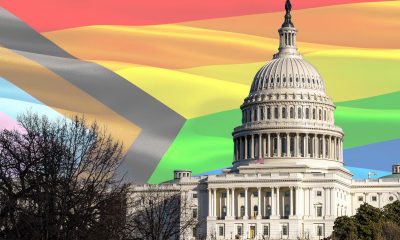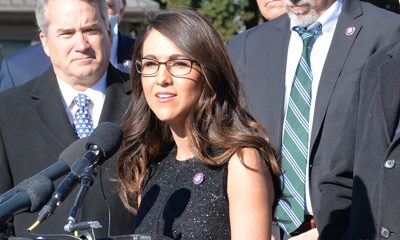California Politics
Governor Newsom to decide on ending pro-LGBTQ state travel ban
The state would be following San Francisco in doing so, as city leaders this spring ended their similar travel restriction
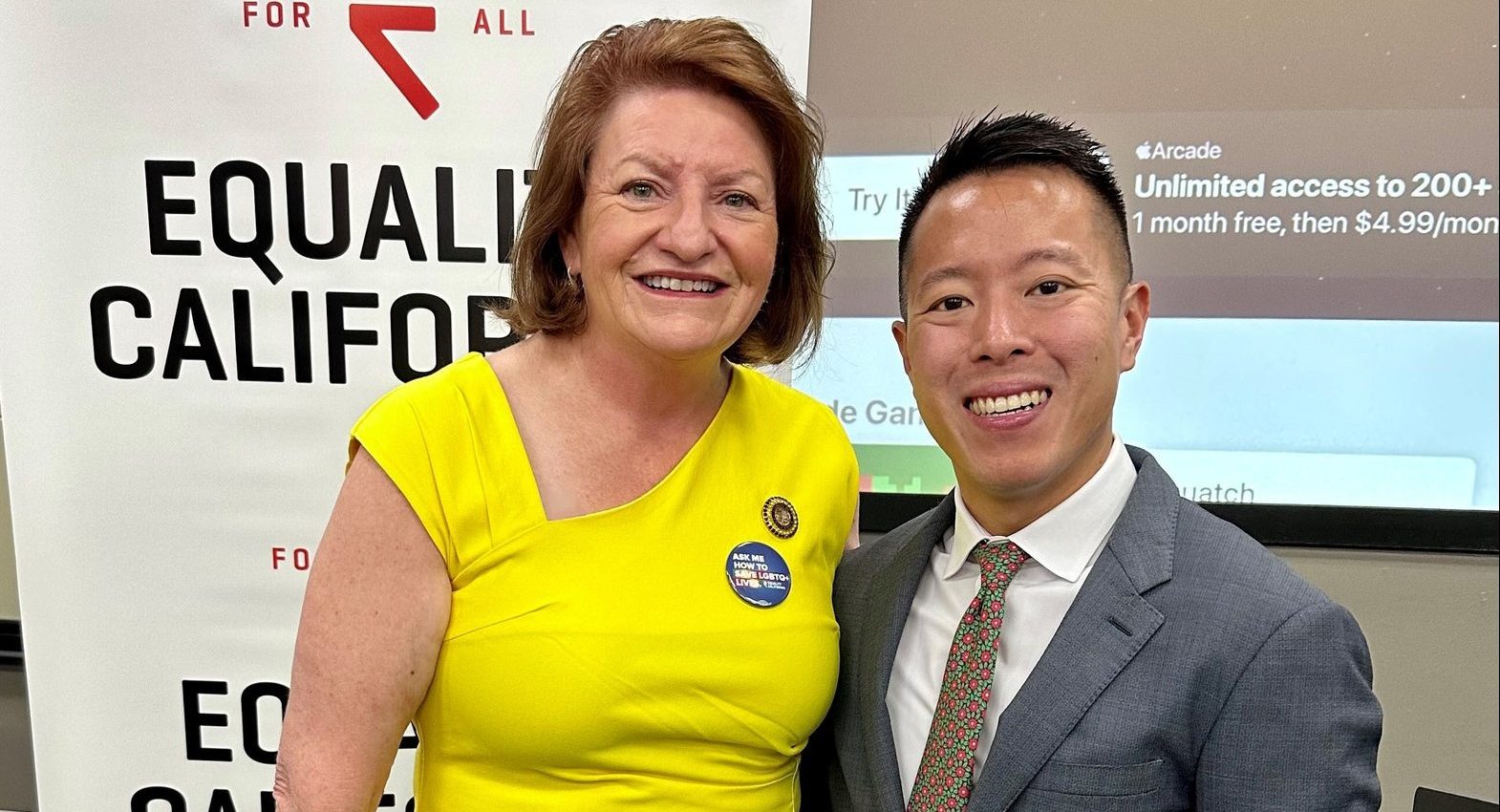
By Matthew S. Bajko | SACRAMENTO – Ending California’s ban on publicly funded travel to states with anti-LGBTQ laws is now in the hands of Governor Gavin Newsom after lawmakers this week sent him a bill to do away with the policy.
The state would be following San Francisco in doing so, as city leaders this spring ended their similar travel restriction.
Legislators first enacted the statewide travel ban policy in 2016 with the hope of seeing their counterparts in other states think twice about adopting LGBTQ discriminatory laws. Under the ban, no taxpayer money is to be used to cover non-emergency travel by state employees, as well as faculty, students, and sports teams at state colleges, to those states that have enacted anti-LGBTQ laws since 2015.
Yet, since its implementation, the travel ban has grown to cover 26 states. The restriction on traveling to Nebraska, added to the list this summer, is set to take effect on October 1.
Citing the lack of impact the travel ban has had in halting other legislatures from passing anti-LGBTQ laws, lesbian outgoing Senate President pro Tempore Toni Atkins (D-San Diego) introduced this year Senate Bill 447 called the BRIDGE Act, which stands for Building and Reinforcing Inclusive, Diverse, Gender-Supportive Equality. It aims to replace the so-called no-fly list with a privately funded pro-LGBTQ marketing effort in the states on it.
San Francisco officials similarly cited continued passage of anti-LGBTQ laws by other states for ending their local travel ban policy, which also covered states that restricted abortion and voting access. They also cited the policy having a negative fiscal impact on the city in higher contracting costs since the policy prohibited city agencies from doing business with companies headquartered in the states covered by the ban.
To press the case for rescinding the state’s travel ban, Atkins created a dedicated website at sd39.senate.ca.gov/sb447 for her SB 447. A broad coalition of LGBTQ groups and leaders had expressed support for doing away with the travel ban, arguing the policy also hampered the ability of LGBTQ advocates to be on the ground in the covered states arguing on behalf of LGBTQ rights.
“As attacks on the LGBTQ+ Community across the country grow, building bridges to change hearts and minds in these communities is now more important than ever,” wrote gay Assemblymember Rick Chavez Zbur (D-Santa Monica/West Hollywood) on X (formerly Twitter), who had advocated for implementation of the travel ban in his former capacity as executive director of statewide LGBTQ advocacy organization Equality California.
Meanwhile, gay Assemblymember Evan Low (D-Cupertino), who wrote the initial legislation establishing the state’s travel ban, had expressed misgivings about ending it. He was one of four members of his chamber who abstained Monday from voting on SB 447, when the bill passed out of the Assembly by a 64-12 vote.
Because Atkins had amended it to include an urgency clause so SB 447 would take effect immediately if signed into law by Newsom, the Senate had to vote on it again Tuesday. It passed out of the chamber 31-6 with three abstentions.
“I remember what it was like to grow up in a time and place where conversations about someone being gay or lesbian only happened in whispers,” stated Atkins. “While years have passed since then, there are still areas of our country where the LGBTQ+ community — and especially our LGBTQ+ youth — feel isolated and fearful for their safety. The BRIDGE Project would be a conduit of hope and compassion, and encourage others to open their hearts and minds to be more accepting and inclusive. It’s within all of us to be that light.”
Newsom, who has faced criticism in the past for making personal trips to states on the banned list, has until October 14 to either sign SB 447 into law or veto it.
**************************************************************************************
The preceding article was previously published by the Bay Area Reporter and is republished with permission.
California Politics
What does Measure G mean for Los Angeles County?
L.A. County makes historic strides toward achieving more government accountability and representation

Measure G campaign declares victory, making way for pivotal and significant reform in Los Angeles County and ushering in a new era of accountability. Voters in favor of the measure hope to see a transformation of the bureaucratic system and more valid representation from the additional board supervisor seats.
“With the passage of Measure G, we are advancing a vision of Los Angeles County that prioritizes transparency, accountability and equitable representation. This measure gives a voice to communities that have often been overlooked, creating a governance structure that truly reflects our diverse County,” said Nichelle Henderson, president of the Los Angeles Community College District.
This measure made history, declaring victory after gaining majority approval from voters. This measure makes history after various attempts to expand the LA County Board of Supervisors failed in 1962, 1976, 1992 and again in 2000.
The measure will now require County departments and agencies to present their budgets to the Board in open, public meetings, prior to adoption of annual budgets, effective immediately.
The “revolving door,” policy prohibiting former County officials from lobbying the County for a minimum of two years after leaving office, will now be strengthened, effective immediately.
Elected officials who are criminally convicted of a crime will be suspended without pay, also effective immediately.
The measure will establish and create an independent Ethics Commission, as well as an Office of Ethics Compliance, led by an Ethics Compliance Officer by 2026.
Under the measure, a County Executive will be elected in 2028 and the Board of Supervisors will nearly double in size by 2032, following the 2030 independent redistricting process.
The motion was originally co-authored by LA County Board Chair Lindsey Horvath and Supervisor Janice Hahn, with the support of Supervisor Hilda L. Solis. Horvath and Solis argued that five people could not effectively represent such a large and diverse population, while Supervisors Holly Mitchell and Kathryn Barger panned the move as rushed and ill-conceived.
LA County residents have affirmed that the way forward lies in a complete transformation of the County’s governance. Now that it’s been approved, the measure will add true checks and balances through a more representative legislative branch and executive branch with direct accountability to voters.
“We will now have the ability to fix what is broken and deliver the results our communities are counting on, especially in the face of threats to our most vulnerable residents from the next federal administration,” said Horvath.
“Through this historic change, we will address the most pressing issues facing Angelenos with greater urgency and accountability, and create a more ethical and representative government fit for the 21st century.”
The approval of this measure made history because previous attempts to change the county’s charter failed, while Measure G was approved through broad-based support from nurses, small businesses, civil rights groups and state–as well as–federal leaders from throughout the county.
The academic community responded to the approval of the measure, which is set to be enshrined into the L.A. County Charter shortly after it is certified by the L.A. County Registrar-Recorder on December 3, 2024.
“This historic victory gives voice to communities who have long been marginalized in the decision-making process,” said Sara Sadhwani, Ph.D., professor of politics at Pomona College. “With a more transparent and responsive governance structure, we’re creating a County government that truly reflects the diversity and needs of its people. This is a win for democracy and for all Angelenos.”
California Politics
Mark Gonzalez triumphs: A new era begins for Assembly District 54
Gonzalez will now represent neighborhoods in Montebello, Commerce, East L.A., Boyle Heights, Chinatown and Koreatown
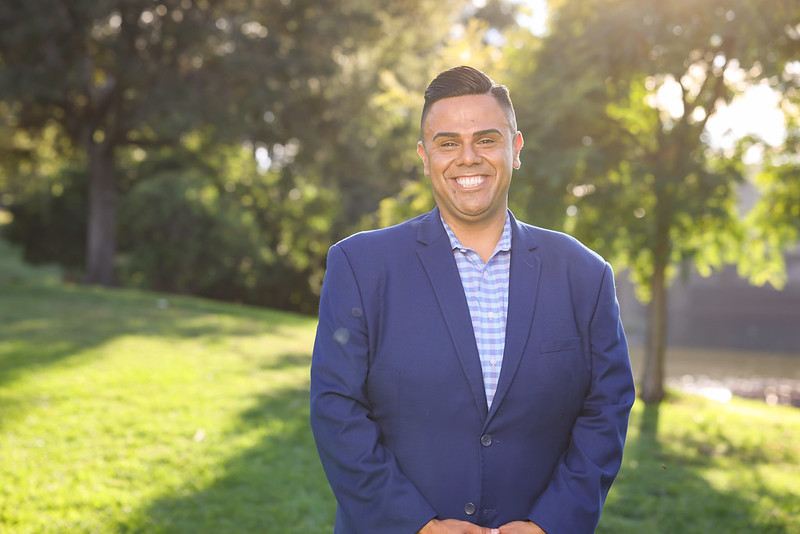
LGBTQ+ Democratic candidate Mark Gonzalez wins Assembly District 54 seat against John Yi and succeeding Assemblymember Miguel Santiago (D-Los Angeles), who did not seek reelection for the position.
Both first-time candidates ran to represent one of the poorest districts in the state, with Gonzalez securing over 12,000 votes over Democrat John Yi, who ran against Gonzalez.
“Running to represent AD54 and earning the votes of those in our community, has been the honor of a lifetime,” said Gonzalez in an X post following the announcement of his win. “I remain committed to serving its people and our state as its next Assemblymember.
His opponent Yi, is the Executive Director of Los Angeles Walks, a pedestrian advocacy group and self-titled Local Nonprofit Leader. Yi is also a Democrat who championed a single-payer healthcare system that would insure all residents of California and previously advocated for the expansion of Medi-Cal benefits for all Californians, regardless of immigration status.
Gonzalez raised nearly ten times more than his opponent, who has had a history in nonprofit leadership and multiracial coalitions to promote health and justice-centered policies.
While running for Assembly, Gonzalez championed raising wages for working families, tackling LA’s homelessness and affordability crisis, and a guarantee for healthcare to all.
Gonzalez is an Assembly staffer who has served the area for over a decade, former Chair of the Los Angeles Democratic Party and Equality California Institute Board member. He worked for former Assembly Speaker John Pérez and served most recently as District Director for the current Assembly member, Miguel Santiago.
“This win is a testament to his dedication to the community and his vision for a more inclusive and equitable Los Angeles,” said Equality California’s executive director, Tony Houang. “We look forward to seeing the positive change he will bring to the Assembly and our state. On behalf of Equality California, we are excited to partner with him to continue the fight for equality and justice for all.”
As a former Chair of the L.A. County Democratic Party, Gonzalez championed change to make community college free, protect air and water quality, make housing affordable and safeguard abortion rights.
He grew up as the son of a single mother who relied on Section 8 to provide housing for them. He is a renter, organizer and activist who knows that the system as it is now, is not working towards the progress, safety or well-being of the marginalized and low-income communities of this district.
“I look forward to working with my colleagues in Sacramento to advance bold, common-sense policies that will make a meaningful impact on individuals and families across the state.”
Gonzalez will now represent District 54, will be responsible for neighborhoods in Montebello, Commerce, East L.A., Boyle Heights, Chinatown and Koreatown.
California Politics
2024 Election: A short guide to California propositions
Prop 3 would ensure marriage equality in state constitution
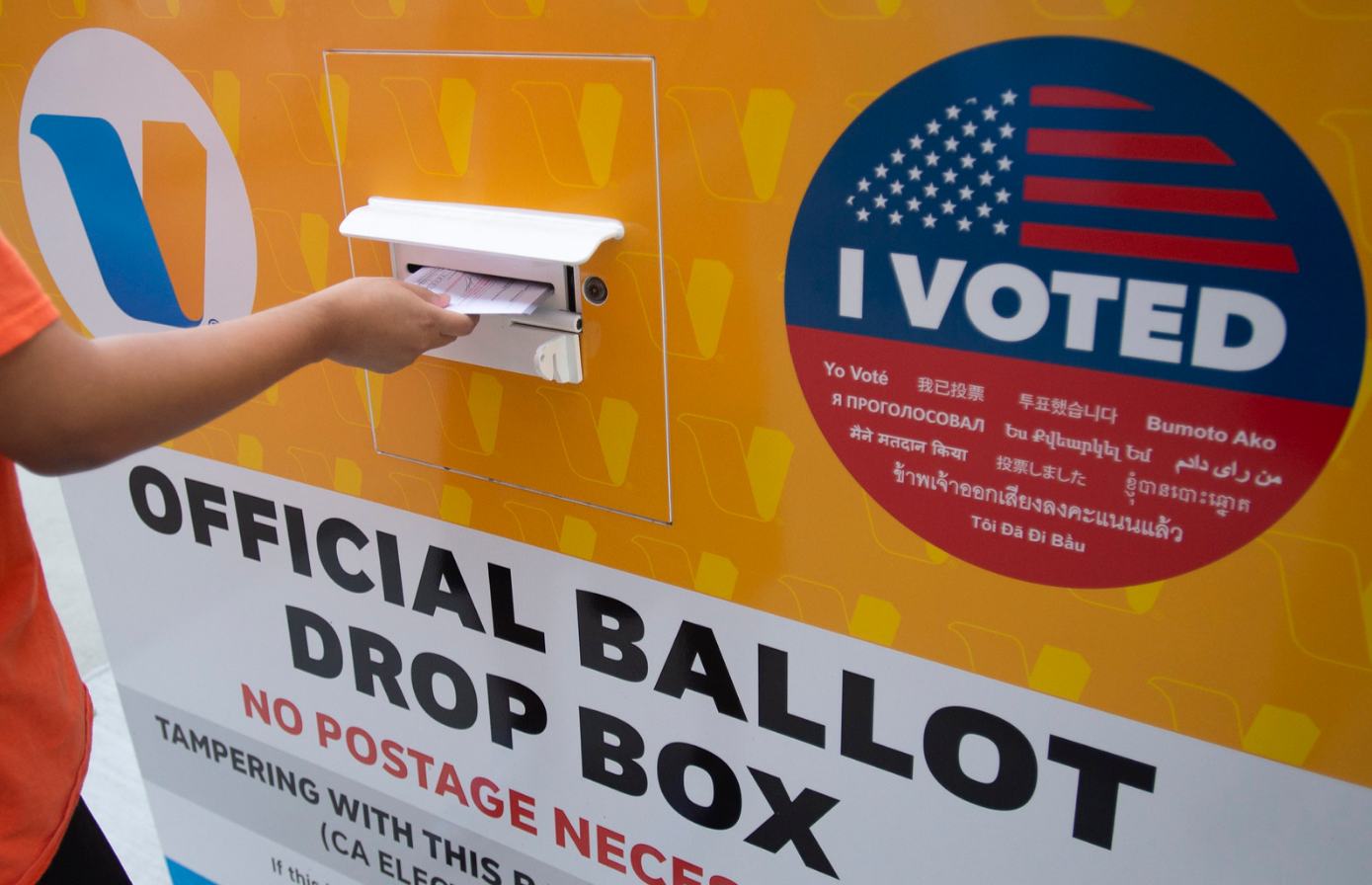
The 2024 Election is upon us and this means that it is time to vote — if you haven’t already.
For some, voting might be confusing or daunting. For others, it might be your first time voting, whether you are now old enough to vote, recently became a citizen or were previously incarcerated and can now vote in California.
The election produces a lot of anxiety for Americans because there are a lot of issues to be determined. A poll by the American Psychological Association suggests that the future of the nation, economy, and presidential election, top U.S. stressors.
The poll also suggests that the biggest concerns are the end of Democracy and political violence.
A Stress in America 2024 report by the APA, points out that 77 percent rate the future of our nation as a significant source of stress, 69 percent cite the presidential election and 73 percent cite the economy, as a significant source of stress.
For people in the LGBTQ+, QTBIPOC, low-income, and otherwise marginalized communities in California, there are a few key issues that are at stake.
We have summarized the propositions on the California ballot.
California propositions
Proposition 2 would authorize $10 billion in bonds for upgrade, repair and construction on K-12 educational facilities, community colleges, charter school and career technical education programs. The bonds would cost California $500 million annually and have to be repaid with interest over the next 35 years.
Proposition 3 is the Constitutional Right to Marriage ballot initiative that if approved, would guarantee that same-sex and interracial marriages will continue to be valid and recognized by the California Constitution, which currently only recognizes heterosexual marriages.
This proposition would guarantee that if same-sex and interracial marriage were to be challenged on the federal level by the Supreme Court, there would be protections on the state level.
Proposition 4 would authorize bonds for safe drinking water, wildfire prevention and protecting communities from natural disasters and other climate risks. A yes vote would approve the state of California to borrow $10 billion to fund activities aimed at conserving natural resources. The bonds would have to be repaid over the next 40 years, at $400 million annually.
Proposition 5 would allow certain local bonds and related property taxes to be approved with a 55 percent vote of the local electorate, rather than the current two-thirds majority vote requirement. The bonds would have to fund local affordable housing, supportive housing and public infrastructure.
Proposition 6 would amend the California Constitution to remove current provisions that allows jails and prisons to impose involuntary servitude to punish crime. State prisons would not be allowed to punish anyone who refuses to work.
Proposition 32 would raise the minimum wage to $17 per hour for employers with more than 26 employees effective immediately and then to $18 as of Jan 1, 2025, and for employers with 25 or fewer employees, to $17 effective on Jan 1, 2025, and $18 as of Jan 1, 2026.
Proposition 33 would repeal the Costa-Hawkins Rental Housing Act of 1995, which currently places limits on local governments from enacting rent control laws. A yes vote would mean that the state would not limit the kinds of rent control laws cities and counties could or could not have. A no vote would mean the state would continue to limit the kinds of rent control laws cities and counties could have.
Proposition 34 would restrict spending of prescription drug revenued by certain health care providers by requiring providers to spend 98 percent of revenues from federal discount prescription drug programs on direct patient care. Increased state costs would likely total millions annually to enforce the new rules on health care entities.
Proposition 35 would provide funding for Medi-Cal health care services by making an existing tax on managed health care insurance plans permanent. New rules would direct how the state must use revenue.
Proposition 36 would allow felony charges for possessing certain drug types and for thefts under $950, if the defendant has two prior drug or theft convictions. This means that if approved, punishment for drug and theft crimes would increase such as longer prison sentences.
California Politics
Ysabel Jurado: A political maverick changing the narrative in LA politics
Jurado says it’s time for something different and she is it.
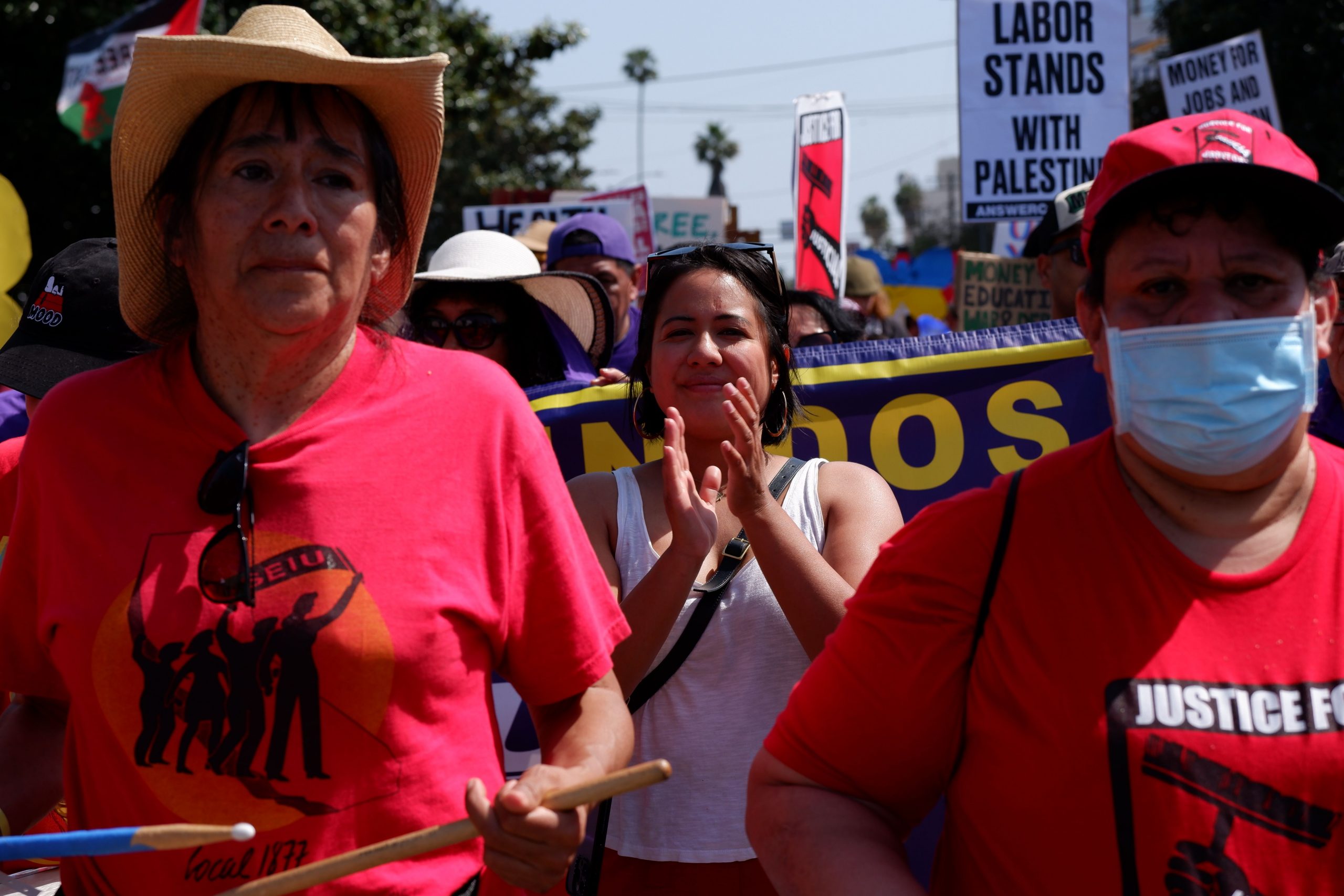
Tenant rights attorney Ysabel Jurado is known as the progressive, grassroots candidate in
the race for the hot seat that her opponent Kevin De León currently holds in Council District 14, even after years of recalls following a racism and homophobia scandal.
Jurado says it’s time for something different and she is it.
“I’m an API woman, I’m educated, I’m a citizen and English is my first language–
among others,” said Jurado in an interview with Los Angeles Blade. “And I’m also proud that on this team, we are largely led by LGBTQ+ folks, women of color, and people of color.”
As an out candidate, Jurado says she is intentional about the people she hires as part of
her campaign team. She is inclusive of nonbinary people and anyone who identifies as part of the QTBIPOC and LGBTQ+ acronyms, because she doesn’t just want to talk about them, she also wants to incorporate their lived experiences in her campaign mission. She says this in part
because of her own identity, but also because of the scandal that rocked De León’s political career.
The scandal follows various City Council members of CD-14 ranting about other BIPOC
members of Council and their LGBTQ+ families. The leaked audio recording included her
opponent De León — who at the time had his eyes set on running for mayor of Los Angeles.
“A lot of the groups talked about in these tapes are the people that we’ve recruited and
who we are making sure to build a coalition with,” said Jurado.
Going into this campaign race, she asked herself: ‘How do I go into this institution and
not become the worst parts of it?’
“If I ever become that, I want you to put my feet to the fire and shift me out of there,
because at that point I have betrayed myself,” responding to the question she had asked herself.
Jurado is currently facing backlash from many community members who support the
police force in Los Angeles, after she was elicited to respond to a question regarding her stance
on police funding. Some of those community members are now actively pushing for her to drop out of the race for Council District 14.
According to NBC4, family members of fallen Los Angeles Police Department officers
have spoken out to say they worry the remarks she made in regards to her stance on police
funding would hurt the LAPD’s ability to recruit new officers.
“In a meeting with students at Cal State LA, I quoted a lyric from a song that’s been part
of a larger conversation on systemic injustice and police accountability for decades…,” said
Jurado to NBC4.
Later, other news outlets reported that the person who elicited the ‘f-ck the police,’
response from Jurado, was a staffer working for De León.
“When you look at what I say and when you look at what I’m doing, I walk the walk and
I’m not going to take any bullshit sitting down, even though [De León] tries,” said Jurado in an
interview.
Jurado has been campaigning for this position since last summer and has since made
dozens of headlines that suggest she is a political force to be reckoned with and has been
building gains in the mostly Latin American Council district. She also brings up the long and problematic history of candidates and elected officials who have resigned, been indicted for corruption, or who have been asked to ‘step down over shady backroom deals.’
“The focus isn’t about me and him and what petty back-and-forth things we say, it’s
about our communities and wanting to make sure we talk to voters and rising above. Because at the end of the day, it’s about the work,” said Jurado. “It’s not about the noise and trying to bring it back to who gets hurt by all these conversations, which are the constituents.”
Jurado is an out LGBTQ single mother and lifelong resident of Highland Park who has
tirelessly fought for tenant rights and protections during her time as a tenants’ rights attorney and housing justice advocate. She prides herself in being a self-made politician who started her journey at Pasadena City College, then earned her bachelor’s degree at University of California, Los Angeles and then went to law school.
Jurado then went on to fight gentrification-driven displacement and in her candidate
statement, she says she spends her days protecting neighborhoods from corrupt developers and politicians.
“This campaign is for ‘the other.’ Being a daughter of immigrants, or whatever your
identity is, you become fluent in two different modalities,” said Jurado. “You know what the
dominant culture is and what the non-dominant culture is and you learn how to navigate through it. I think that is a superpower our people have, people who have always been ‘othered.’
Jurado is currently canvassing in the community, leading up to the election with support from Hugo Soto-Martinez, LA City Council Member of CD-13 and Eunisses Hernandez, LA City Council Member CD-1.
California Politics
What you missed at the CD-14 debate between Ysabel Jurado and Kevin De León
LGBTQ+ candidate faces off against opponent Kevin De Leon on community forum on Wednesday
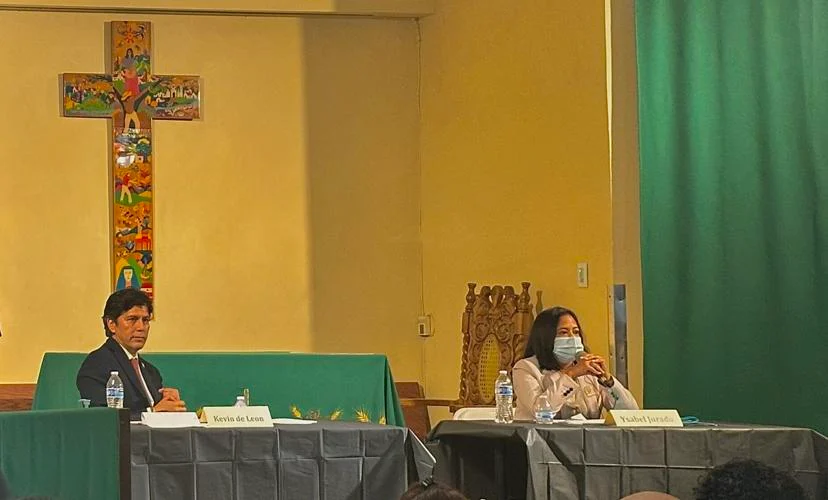
Los Angeles Council District 14 (CD-14) candidates Ysabel Jurado and Kevin de León sparred over their qualifications in what could have been their last in-person debate before the November election.
Wednesday’s CD-14 debate, a district home to approximately 265,000 people, 70% of them Latin American, offered the public a chance to hear from both candidates and their stand on issues such as homelessness, public safety and affordable housing, among other things.
CALÓ News was one of the media outlets that were present inside Dolores Mission Catholic Church in Boyle Heights, where the debate was held. Below are our reporter’s main takeaways.
People showed up and showed out. More than 300 people attended the debate, which was organized by Boyle Heights Beat and Proyecto Pastoral. More than 260 people gathered inside the church and the rest watched via a livestream projected on the church’s patio.
The debate was bilingual, with translation services available for all, honoring the many Spanish speakers that live in the district, as Brendan P. Busse, pastor of the church, said in the opening statement.
As part of the event guidelines, Busse also shared that no applause or booing was to be permitted, a rule that was broken within the first ten minutes of the forum. “Where you are tonight is a sacred place. People who are in need of shelter sleep here and have for the last 40 years,” he said when referring to the church transforming into a homeless shelter at night for over 30 adults. “Power and peace can live in the same place.”
That was the most peaceful and serene moment throughout the two-hour forum.
What followed was traded insults and competing visions from both candidates.
One of the first stabs occurred when De León accused Jurado of wanting to “abolish the police” and when Jurado reminded the public of De Leon’s “racist rhetoric,” referring to the 2022 scandal over the secretly recorded conversation with Gil Cedillo and Nury Martínez where they talked about indigenous Mexicans, Oaxacans, the Black and LGBTQ+ communities and councilman Mike Bonin’s adopted son.
“I made a mistake, and I took responsibility. I have been apologizing for two years,” De León said. “Just as in the traditions of the Jesuits, love, reconciliation [and] peace, one must choose if we are going to be clinging to the past or move forward. I choose to move forward.”
When Jurado was asked about her stance on police, she said she had never said she wanted to abolish the police. “Don’t put words in my mouth,” she told De León. “I have never said that,” she said. “We put so much money into public safety into the LAPD yet street business owners and residents in these communities do not feel safer. The safest cities invest in communities, in recreation and parks, in libraries [and] youth development.”
De León and Jurado also discussed their plan to work with the homeless population, specifically during the 2028 Olympic and Paralympic Games in Los Angeles. In Los Angeles County, an estimated 75,312 people were experiencing homelessness, as stated in the 2024 homeless count. For CD-14 the issue of homelessness takes a higher level as it is home to Skid Row, which has one of the largest homeless populations in the U.S.
“We should continue to house our unhoused,” De León said.
He followed this by saying that under his leadership, CD-14 has built the most interim housing than “in any other place in the entire city of L.A.” He made a reference to the Boyle Heights Tiny Home Village and 1904 Bailey, both housing projects in CD-14.
“We need safety when the Olympics come,” he added.
Jurado said De León’s leadership has fallen short in his years in office, specifically when it comes to the homeless population and said that housing like the tiny homes is not sufficient for people in the district to live comfortably.
“My opponent has governed this district, Skid Row, for over 20 years. Has homelessness in this district gotten better? We can all agree that it hasn’t,” she said. “County Supervisor Hilda Solís put up 200 units that are not just sheds; they have bathrooms, they have places and they have support services. Why hasn’t [CD-14] gotten something better than these tiny homes?”
One of De León’s repeating arguments in various of his answers was the fact that Jurado has never held public office before. “I’ve dedicated my whole life to public service, to the benefit of our people. My opponent, to this day, has not done one single thing,” De León said in the first few minutes of the debate.
In one of the questions about low-income elders in the district, he listed some of his achievements when helping this population, including bringing free vaccines for pets of seniors of this district and food distributions, which, as De León noted, help people with basic food needs, including beans, rice and chicken. “The same chicken sold in Whole Foods,” he said.
Jurado defended herself against the reality of never holding public office and said her work as a housing rights attorney and affordable housing activist have given her the tools and experience to lead the district in a different direction than the incumbent, De León. “We can’t keep doing the same thing and expect different results,” Jurado said. ‘We need long-term solutions,” she said.
Last month, The L.A. Times also reported on Jurado’s past political experience, including working on John Choi’s unsuccessful 2013 run for City Council, as well as her work as a scheduler in Mayor Eric Garcetti’s office and how she was appointed by Garcetti to the Human Relations Commission in 2021.
She later added that she was proud to already have the support of some of the L.A. City Council members, such as Eunisses Hernández, Nithya Raman and Hugo Soto-Martínez, which De León later referred to as the “socialist council members.”
After the debate, CALÓ News talked to both candidates and asked how they thought the debate went.
“It was a spirited debate, no question about it,” De León said. “Sometimes elections can take a real ugly twist that is very similar to Trump-ian characteristics. Like Donald Trump just says whatever he wants to say, no matter how outlandish [or] inaccurate it is.”
When asked the same question, Jurado said, “ I think my opponent said a bunch of lies and said that he has plans for this district when he’s had four years to execute all of them. It’s really disappointing that only now he suddenly has all these ideas and plans for this district.”
Both candidates told CALÓ News they will continue working until election day and making sure CD-14 residents show up to vote.
“But I think past the debate[s], it’s just [about] keeping your nose to [the] grindstone, working hard, and taking nothing for granted, knocking on those doors and talking directly to voters,” De León said.
Jurado said she still has a couple other events that she and her team are hosting before election day. “I’m out here talking to voters. We want to make sure that people know who I am and that they have other options. People are disappointed. We’re going to keep folks engaged and make sure that [they] turn out to the polls,” she said.
Jorge Ramírez, 63, from Lincoln Heights, said he has been supporting De León since his time in the State Senate and said he will continue to vote for him because he doesn’t know much about his opponent. “He is the type of person we need. He’s done a lot for immigrants,” he said. “The other person, we don’t know much about her and she’s not very well known. She doesn’t have much experience in this field.”
Alejandra Sánchez, whose daughter goes to school in Boyle Heights and lives in El Sereno, said she believes CD-14 has been in desperate need of new leadership and worries that many people will vote for De Leon just because he is who they have known for so long. “It’s very powerful to see a woman leader step in… It’s been an incredible year to see a woman president elected in Mexico, a woman running for president in the U.S. and a woman also running for leadership here in our community,’ she said. “That’s part of the problem… we are afraid to think about something new, about the new leadership of someone doing things differently.”
General election day will take place on Tuesday, November 5, 2024. Early voting began on October 7. You can register to vote or check your registration status online on the California Online Voter Registration page.
California Politics
California Senate race: Trans Democrat Lisa Middleton aims for historic win in Inland Empire
Candidate hopes to represent 19th Senate District
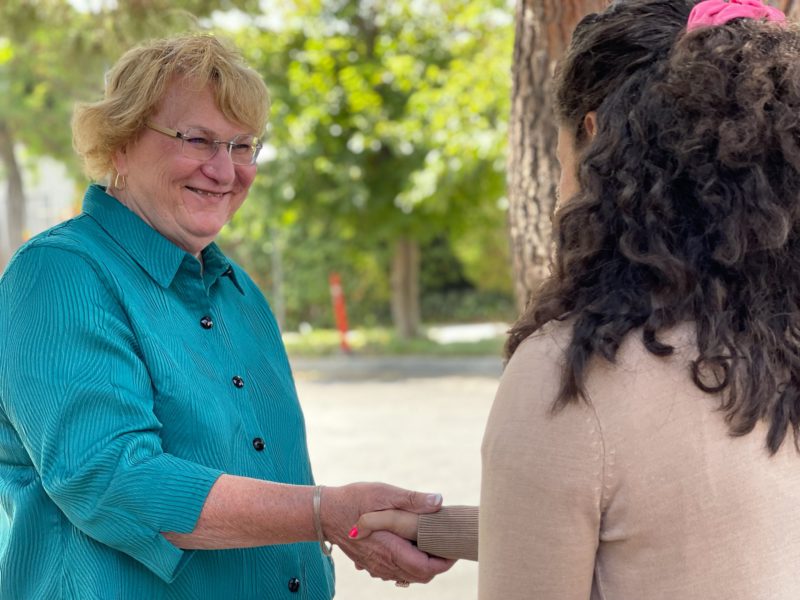
Democrat Lisa Middleton is the first openly transgender person elected to a non-judicial office in California and is currently running to represent the 19th Senate District in a tight Inland Empire race.
She is one of more than 21 out LGBTQ candidates running for a U.S. congressional, state Senate or state Legislative seat in 2024.
As a longtime leader of the LGBTQ community, Middleton works to protect and advance civil rights. She serves on the Equality California Institute’s board of directors and would become the first openly trans person to serve in the California State Legislature.
Middleton began her transition 30 years ago, but her reputation in politics, fraud investigation and governance started long before. Middleton, 72, is the former mayor of Palm Springs after serving as mayor pro tempore from 2020 to 2021 and then becoming the first openly trans mayor in California, succeeding Christy Holstege in December 2021.
Middleton is the child of blue-collar union workers.
In addition to supporting LGBTQ rights, she also supports projects such as renewable energy using wind and solar, stating that these are win-win solutions that help labor workers and combat climate change.
Middleton is running against GOP Latina Rosilicie Bogh, 52, a former elementary school teacher, school board member, and realtor.
Bogh has publicly opposed bills that boost gender-affirming health care services and protect trans children and their families from being criminalized for seeking treatment in California.
Bogh has also abstained from voting on gay marriage rights in the state constitution and recognizing Pride Month.
She gained attention earlier this year when she stood up to oppose a law that protects educators and school staff from forcibly outing trans children to their families.
Assembly Bill 1955 went into effect earlier this summer after getting support from Gov. Gavin Newsom and backlash from Elon Musk, leading him to withdraw X and SpaceX from California.
The race for this seat is stimulated by newly redrawn district boundaries that now include thousands more registered Democrats.
The new 19th Senate District now spans from Coachella Valley to the San Bernardino Mountains and from the San Jacinto Valley to the High Desert, including highly visited places like Big Bear City, Joshua Tree, and Palm Springs.
The redrawn district includes San Bernardino County, which has Republican strongholds, but also includes the more liberal areas of Riverside County and Palm Springs, totaling around half a million voters.
A Report of Registration released earlier this summer shows that the district is now nearly even in terms of Republican and Democratic support, with 35 percent and 36 percent respectively.
In the March primary election, Bogh won 54 percent of the vote, while Middleton secured 46 percent.
In the 2020 presidential election, Donald Trump won the district by a narrow margin.
Both candidates are trailblazers, so who will win over the majority vote in the upcoming election that is only 57 days away?
Both candidates say they’re avoiding culture war clashes to focus on bread-and-butter issues.
For Middleton, the bread-and-butter issues are protecting reproductive care, fixing roads, creating jobs, increasing neighborhood safety, demanding accountability for taxpayers, and building housing to address homelessness.
Middleton markets herself as a neighborhood advocate who provides “common-sense solutions” to the region’s challenges.
Her track record includes working as an auditor for California’s State Compensation Insurance Fund, working her way up to becoming senior vice president of internal affairs and serving as chair of California’s Fraud Assessment Commission.
Her goal in the Legislature is to eliminate wasteful spending of tax dollars.
As mayor of Palm Springs, Middleton led the city’s economic recovery from the COVID-19 pandemic by helping small businesses reopen and creating well-paying jobs.
Prior to that, Middleton was appointed to the Board of Administrators of the California Public Employees Retirement System (CalPERS), which aims to build health and retirement security for California’s state and local school employees. Currently, she serves as chair of the Finance and Administration Committee and vice chair of the Risk and Audit Committee.
Middleton married her wife Cheryl, a now-retired nurse, in 2013, shortly after moving to Palm Springs. Together they have two children who are educators.
Middleton was also included in the 2016 Pride Honors Award at Palm Springs Pride, receiving the Spirit of Stonewall Community Service Award.
Organizations like Planned Parenthood, Reproductive Freedom For All California, National Union of Healthcare Workers, California Women’s List, and others support Middleton.
A list of openly LGBTQ candidates on the California ballot can be found below:
U.S. House of Representatives:
- Congressional District 16: Evan Low
- Congressional District 23: Derek Marshall
- Congressional District 39: Mark Takano
- Congressional District 41: Will Rollins
- Congressional District 42: Robert Garcia
California Senate:
- Senate District 3: Christopher Cabaldon
- Senate District 11: Scott Wiener
- Senate District 17: John Laird
- Senate District 19: Lisa Middleton
- Senate District 25: Sasha Renee Perez
- Senate District 31: Sabrina Cervantes
California Assembly:
- Assembly District 24: Alex Lee
- Assembly District 47: Christy Holstege
- Assembly District 51: Rick Chavez Zbur
- Assembly District 54: Mark Gonzalez
- Assembly District 57: Sade Elhawary
- Assembly District 58: Clarissa Cervantes
- Assembly District 60: Corey Jackson
- Assembly District 62: José Solache
- Assembly District 72: Dom Jones
- Assembly District 78: Chris Ward
California Politics
Newsom signs law banning schools’ gender notification policies
Assemblymember Chris Ward (D-San Diego) introduced AB 1955
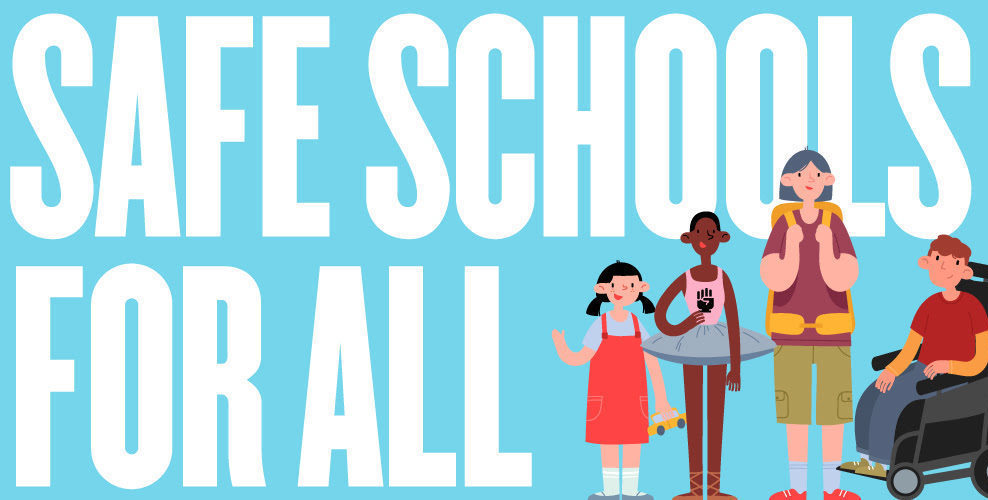
Governor Gavin Newsom signed Assembly Bill 1955 on Monday, banning forced outings in California schools after facing fierce opposition.
The signature comes after Newsom faced pressure to sign, leaving many to question his stance on LGBTQ issues after vetoing a bill that would have considered parents’ acceptance of a child’s identity or orientation in legal custody battles.
The bill, proposed by Assemblymember Chris Ward (D-San Diego) earlier this year, bans schools from creating or enacting policies that would out students to their parents about their gender, pronouns, name change, or sexual orientation.
“This comes from a growing national attack on LGBTQ+ people and in particular transgender individuals, with several California school districts and other states enacting policies that explicitly compel teachers to tell parents that their child identifies as transgender,” said Ward during a hearing last month.
“Forced outing policies harm everyone: Parents, families, and school staff by unnecessarily compelling the staff to involve themselves in family matters and removing the opportunity for families to build trust and have conversations on their own terms.”
The introduction of the bill follows a string of policies requiring counselors, administrators, teachers, school staff, and anyone else at the school to notify parents about their child’s transition or change of pronouns.
AB 1955 supports the Support Academic Futures and Educators for Today’s Youth Act (SAFETY Act) in preventing schools from enforcing or enacting forced outing policies.
“As a nonbinary educator working at a middle school, I definitely feel relieved to have some solid protection at the state level, and I feel empowered to continue advocating for my LGBTQ+ students,” said Amanda Estrada, a middle school teacher at Los Nietos Unified School District.
Lawmakers were discordant last month at a hearing that erupted in emotions over the issue. Following the hearing, legislators sent the bill to Newsom to stop these policies against LGBTQ students, families, and educators who felt passionately about the issue.
Last summer, Chino Valley Unified School District began enforcing the policy notifying parents of any requests “to change any information contained in a student’s official or unofficial records.” The policy was later blocked in court, sparking a civil rights lawsuit from California, bringing in Attorney General Rob Bonta to advocate against the policy.
Earlier this year, the school district revamped the policy, leaving out terms like gender, biological sex, and bathrooms but continues to push for outing students based on any changes they may request.
Existing law regarding the polarizing issue requires the State Department of Education to develop school-based resources and update previous resources that aim to support LGBTQ students. The new law now requires the State Department of Education to develop community-based resources for LGBTQ students and their families as well.
Existing law also prohibits discrimination against students participating in any program or activity conducted that receives or benefits from state-level funding. The new law will now include “any governing body or body of those educational entities from enacting or enforcing policy, rule, or administrative regulation that requires an employee or a contractor to disclose any information related to a pupil’s consent unless otherwise required by law.”
The law also states that students should feel “safe, supported, and affirmed for who they are at school.” This requires allowing them to choose when and how they want to make their new identities or orientation public and making resources available for them and their families.
This legislative push for laws and policies that protect LGBTQ youth will continue to face opposition as transition and gender identity continues to be a heavily polarizing and political issue among families.
The proposed bill cites research by the Trevor Project, stating that affirming school environments significantly lower the odds of transgender and LGBTQ youth attempting suicide.
Further findings also suggest that educators often face harassment and retaliation attempts because of their lawful efforts to uphold student privacy and protect them from discrimination.
“Over the past couple of years, I started to worry more about the creep of homophobic and transphobic rhetoric across the state, mostly through small districts like mine,” said Estrada. “Now that we have this law in place, I’ve got some peace of mind, and hopefully going forward, my students will too.”
California Politics
Update: Calif. proposes LGBTQ commission amid escalating national and local challenges
Assemblymember Alex Lee introduced Assembly Bill 3031
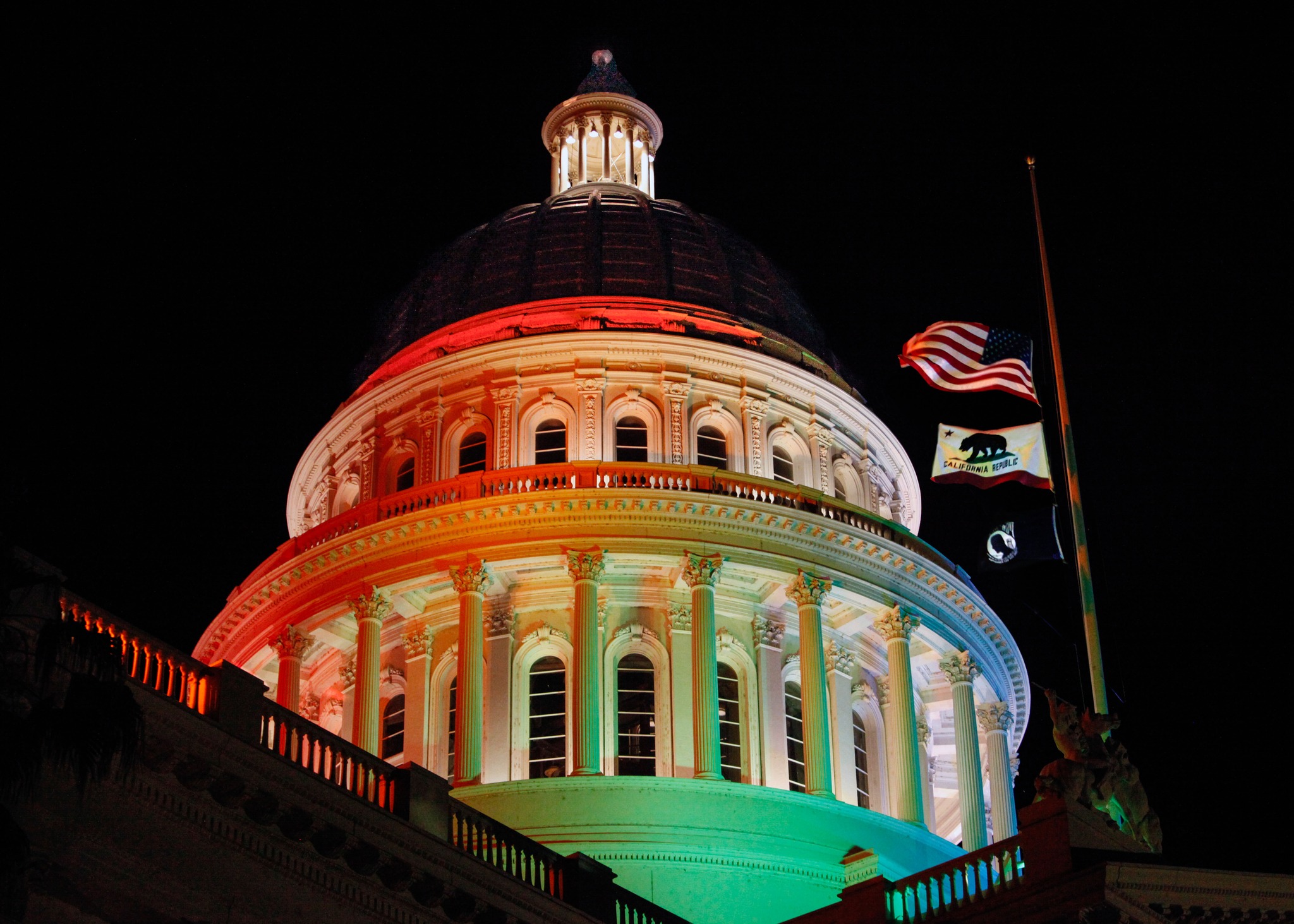
In response to mounting pressures on LGBTQ rights across the nation, California lawmakers have introduced Assembly Bill 3031 that would create a statewide LGBTQ commission.
This initiative comes at a critical juncture, as the LGBTQ community faces intensifying challenges even within the traditionally progressive Golden State.
Recent years have seen a troubling trend in smaller California cities, where school boards face pressure from anti-LGBTQ groups to withdraw supportive curriculum and disband LGBTQ student organizations.
In communities like Chino Hills, for instance, school boards have passed policies requiring schools to forcibly out transgender students to their parents, a move that has sparked intense debate and concern among LGBTQ advocates. These local battles mirror a larger national movement seeking to limit LGBTQ visibility and support in educational settings.
Simultaneously, some city councils, most recently in Downey, have moved to ban the Pride flag from flying on public property, a symbolic gesture with far-reaching implications for LGBTQ acceptance and representation.
At least one leader of these efforts, Claudia Frometta, a Downey, California councilmember who unsuccessfully voted against funding of LGBTQ Pride events in that city and one year later lead a successful effort to ban the flying of the Rainbow Flag on city property, has risen to national prominence. Frometta was recently elected President of the highly influential National Association of Elected Officials (NALEO).
Such developments contribute to a climate of exclusion and send a powerful message about the value placed on LGBTQ lives and experiences in these communities and organizations.
These local actions unfold against a backdrop of rising hate crimes targeting LGBTQ individuals.
Between 2021 and 2022, California witnessed a 29 percent increase in reported hate crimes motivated by sexual orientation bias, totaling over 391 incidents. This surge in violence has sparked alarm among LGBTQ advocates and underscores the urgent need for comprehensive state-level action to protect and support the LGBTQ community.
The proposed commission aims to address these multifaceted challenges.
Assemblymember Alex Lee, who serves California’s 24th Assembly District (Alameda County and Santa Clara County), the bill’s author, emphasized its importance:
“It’s critical that the lived experiences of LGBTQ+ community members are recognized by our government,” he said. “The commission will play an important role in informing policy and programs for the LGBTQ+ community.”
LGBTQ advocates have expressed particular concern over the wave of anti-LGBTQ+ legislation sweeping across the country.
In 2023 alone, 520 anti-LGBTQ bills were introduced in more than 40 states, with 84 signed into law. The pace has not slowed in 2024, with 490 such bills proposed by June. This legislative onslaught has targeted various aspects of LGBTQ life, from restricting access to gender-affirming care for transyouth to limiting discussions of LGBTQ topics in schools.
Adding to these concerns is the Republican Party’s Project 2025 blueprint — a comprehensive plan that outlines potential rollbacks of LGBTQ rights should the party regain control of the White House. This document suggests threats to marriage equality and protections in employment and housing and other hard-won victories. The combination of ongoing legislative attacks and the potential for sweeping federal changes has created a climate of uncertainty and fear within the LGBTQ community, even in progressive states like California.
Equality California Executive Director Tony Hwang highlighted the urgency of the situation.
“California has come a long way in the fight for full, lived equality for LGBTQ+ people, but our state is not immune to the wave of anti-LGBTQ+ hate, violence and right-wing extremism sweeping the country,” he said. “California’s commitment to the health, safety and dignity of LGBTQ+ people is needed now more than ever.”
The proposed commission would consist of nine members representing California’s diverse LGBTQ community. The governor would appoint five members, while the Assembly speaker and the Senate Rules Committee would each appoint two members. This structure aims to ensure a broad representation of perspectives and experiences within the LGBTQ+ community.
The commission’s responsibilities would be wide-ranging and impactful. It would act in an advisory capacity to the state legislature and governor on policy matters affecting the LGBTQ community. This would involve monitoring proposed legislation and regulations, coordinating with other relevant commissions on issues of mutual concern, and working with state agencies to assess the impact of their programs and policies on LGBTQ individuals.
The commission would also engage in fact-finding and data collection to gain a comprehensive understanding of the experiences and needs of LGBTQ Californians. This would involve holding public hearings to gather input directly from community members, as well as conducting research on various issues affecting the LGBTQ population.
The commission would be required to submit annual reports to the legislature and governor, summarizing its findings and offering policy recommendations to address the needs of the LGBTQ community.
The bill has garnered support from various quarters, including local government bodies.
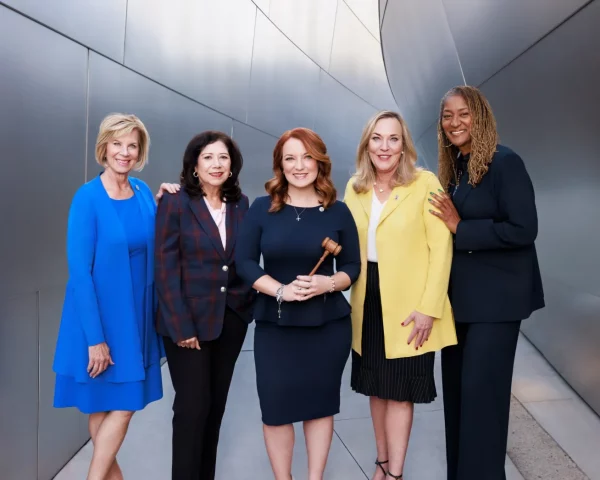
The Los Angeles County Board of Supervisors in January 2024. From left to right: Janice Hahn, Hilda Solis, Lindsey Horvath (chair), Kathryn Barger and Holly Mitchell. (photo courtesy of the LA County Board of Supervisors)
The Los Angeles County Board of Supervisors on June 25 officially threw its support behind AB 3031.
Supervisors Lindsey Horvath and Hilda Solis in a motion they put forth said the bill would create a commission “that represents California’s diverse LGBTQ+ community and shines a light on the unique challenges that LGBTQ+ people face.”
The Bay Area Municipal Elections Committee President Drew Lloyd told the Bay Area Reporter that having “a commission that addresses disparities facing California’s queer community and works to elevate our community’s unique experiences, voices, and concerns, is invaluable. BAYMEC enthusiastically endorses the creation of this commission and looks forward to working with all stakeholders and our community to create a safe and unique space that leads to a better California for all.”
“I thank my colleague Assemblymember Alex Lee for introducing this important legislation to establish the California LGBTQ+ Commission, which will empower our LGBTQ+ community with independent representation to advise the Legislature and governor on policy matters and provide recommendations for future actions we can take to identify and reduce systemic inequalities and barriers,” Assemblymember Evan Low, co-sponsor of AB 3031 and a member of the Legislative LGBTQ Caucus, stated,
As AB 3031 progresses through the legislative process, it represents California’s proactive stance in safeguarding LGBTQ rights amidst a challenging national landscape. The commission’s establishment would signal the state’s commitment to not only maintaining existing protections but also actively addressing the evolving needs of its LGBTQ residents in the face of unprecedented threats to their rights and well-being.
The creation of this commission comes at a time when LGBTQ Californians, estimated at 2.7 million or roughly 9 percent of the state’s adult population, face both longstanding and emerging challenges. From workplace discrimination and healthcare disparities to the recent surge in anti-LGBTQ rhetoric and policy proposals, the need for a dedicated body to address these issues has never been more apparent.
As the bill moves forward, many in California’s LGBTQ community and their allies are hopeful that this commission will provide a powerful voice for their concerns at the highest levels of state government. In doing so, it may serve as a model for other states seeking to protect and empower their LGBTQ residents in an increasingly challenging political climate.
California Politics
Effort to put measure limiting trans youth’s rights on Calif. ballot fails
The group claimed it had gathered more than 400,000 signatures, falling short of the requisite threshold number for inclusion on the ballot
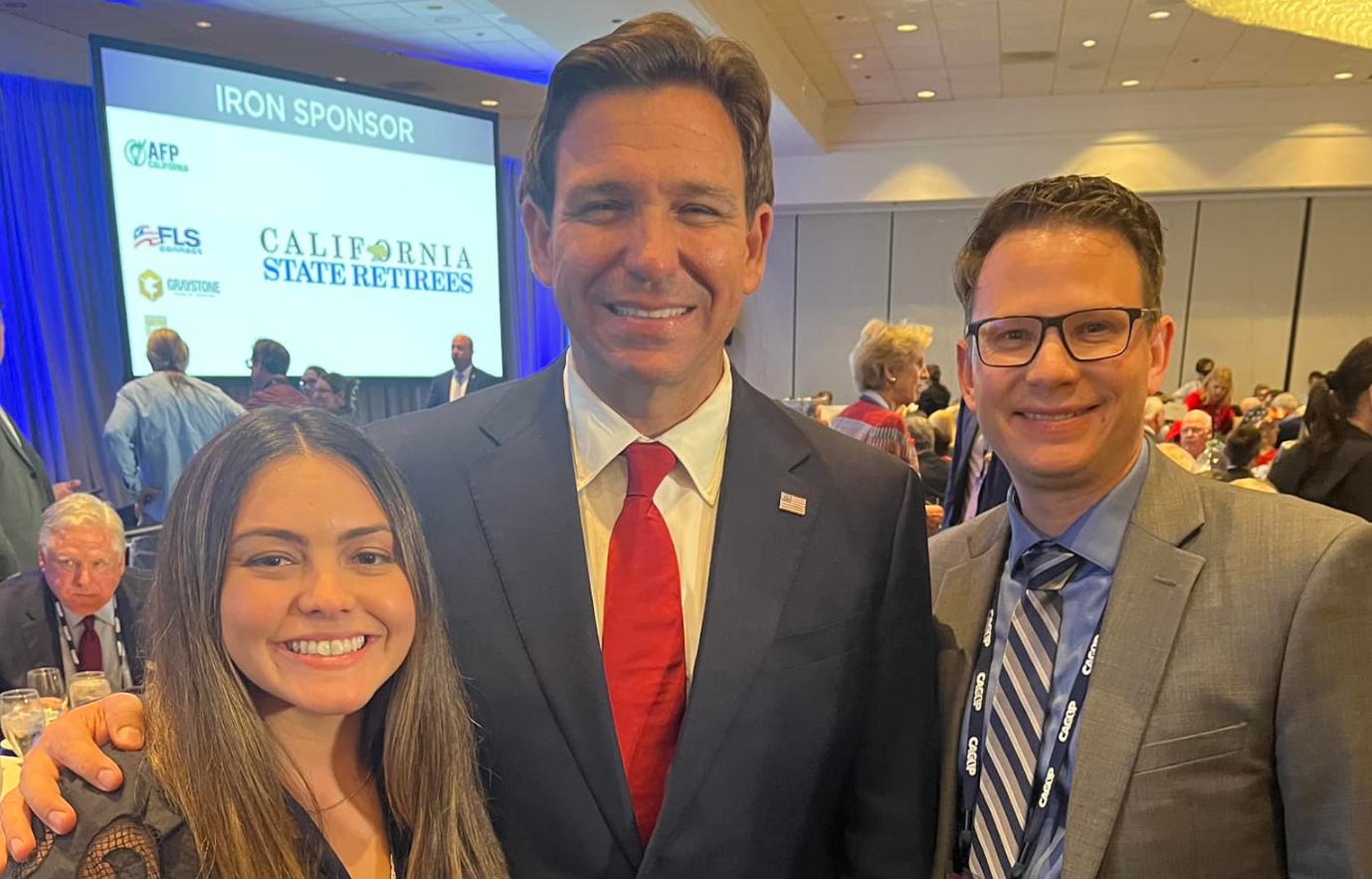
SACRAMENTO – The effort by the anti-LGBTQ+ conservative group Protect Kids California, headed by Roseville school board member Jonathan Zachreson, to collect some 550,000 valid signatures to place a transphobic trans youth proposal on the November 5 ballot has failed.
In a press release on Tuesday, the deadline set by the California secretary of state, the group claimed it had gathered more than 400,000 signatures, falling short of the requisite threshold number for inclusion on the ballot.
Protect Kids California submitted the proposed ballot initiative—presented as the “Protect Kids of California Act of 2024,” last September. The proposed ballot initiative would have:
- Forced outing of transgender youth to their parents, ensuring that trans kids cannot have safety or privacy in schools if they are not ready to come out to family. Often these policies also include violations of privacy for the student when they discuss their gender identity with school counselors.
- Banning of transgender youth from sports that match their gender identity, stigmatizing them and often forcing them out of sports altogether. Notably, these provisions typically fail to differentiate between high-stakes elite competitions and casual middle school teams. They also generally don’t provide for pathways to participation like hormone therapy, a method that has been researched and employed to address concerns of potential “unfair advantages” in competitions. California, which allows youth to access gender affirming care, will have youth who never underwent the puberty of their assigned sex at birth who would also be banned under this provision.
- Banning gender affirming care for trans youth shown to be lifesaving. Gender affirming care is associated with a 73% reduction in suicidality and over 50 studies assembled by Cornell University show its benefits. California is one of several states that has recently moved to protect transgender youth and their medical care, and such a restriction would impact a large number of transgender kids in the state.
We want to thank our tens of thousands of supporters and volunteers for this truly historic effort!
— Protect Kids CA (@ProtectKidsCA) May 28, 2024
Together, we collected over 400,000 signatures – an unprecedented achievement for a 100% grassroots effort. You really are amazing! 🙏
While it is unfortunate we did not have… pic.twitter.com/DdRJinW2uY
“We are relieved that anti-LGBTQ+ extremists have failed to reach the required signature threshold to qualify their anti-transgender ballot initiatives to the November 2024 ballot. Equality California will continue to advocate for the rights of LGBTQ+ youth everywhere, and push back against any and all efforts by extremist groups who seek to discriminate against them,” said Tony Hoang Equality California Executive Director. “To every LGBTQ+ youth in California: know that you are loved and valued.”
A coalition of leading LGBTQ+ and allied organizations including Equality California, TransFamily Support Services, The TransLatin@ Coalition, Planned Parenthood Affiliates of California, ACLU California Action, Lambda Legal, National Center for Lesbian Rights, Gender Justice LA, California TRANScends, Tranz of Anarchii Inc. issued the following statement in response to the failure of anti-LGBTQ+ extremists to qualify an anti-transgender initiative for the 2024 California General Election ballot:
“We are relieved that this dangerous initiative did not meet the required signature threshold to appear on the ballot.
This extremist proposal sought to ban essential healthcare for transgender youth, forcibly out transgender students without consent or regard for their safety, and ban transgender youth from accessing school facilities or playing sports that correspond with their gender identity.
Still, we know that this fight isn’t over. A handful of school districts across the state have already implemented their own harmful policies targeting LGBTQ+ youth, and we are grateful to California Attorney General Rob Bonta and the California Department of Education for challenging the discriminatory actions of such districts in court. We are also proudly supporting the SAFETY Act (AB 1955), by Assemblymember Chris Ward and the Legislative LGBTQ Caucus, which will protect transgender students across California from harmful forced outing policies and provide them and their families with the resources and support they actually need to thrive.
We will never stop fighting for LGBTQ+ youth to be their authentic selves, feel protected and to be safe.”
The anti-LGBTQ+ group placed partial blame for the failure on California Attorney General Rob Bonta, who the group had sued over the title and summary he assigned to its ballot measure that would strip rights from transgender minors.
The Bay Area Reporter noted the Liberty Justice Center filed a lawsuit February 13 in Sacramento County Superior Court on behalf of Protect Kids California that alleged Bonta’s personal beliefs led to a biased title and summary. Therefore, the center contended the ballot measure proponents should be given 180 additional days for signature gathering without discounting signatures already collected.
“Respondent [Bonta] has demonstrated that he personally, and in his official capacity, is opposed to any kind of notification by a public school to a parent or guardian that his or her child is exhibiting signs of gender dysphoria when the child asks the school to publicly treat him or her as the opposite sex with a new name or pronouns, and to allow the child to use the sex-segregated facilities of the opposite sex,” claimed the groups in their lawsuit.
But a Sacramento Superior Court judge sided with Bonta in a ruling that was first issued tentatively April 19 and was made final April 22. Judge Stephen Acquisto ruled that Bonta’s title and summary are accurate.
“Under current law, minor students have express statutory rights with respect to their gender identity,” Acquisto stated. “A substantial portion of the proposed measure is dedicated to eliminating or restricting these statutory rights. … The proposed measure would eliminate express statutory rights and place a condition of parental consent on accommodations that are currently available without such condition.
“The proposed measure objectively ‘restricts rights’ of transgender youth by preventing the exercise of their existing rights. ‘Restricts rights of transgender youth’ is an accurate and impartial description of the proposed measure,” Acquisto added.
The attorney general’s office has some leeway when it comes to determining ballot titles, the judge noted.
In a statement provided to the B.A.R. on April 24, after news that the decision had been made permanent, Protect Kids California attorney Nicole Pearson stated, “The mental gymnastics used to justify this prejudicial title and summary are not only an egregious abuse of discretion that entitles our clients to an appeal, but a chilling interpretation of law that jeopardizes the very foundation of our constitutional republic. We are reviewing our options for an appeal of these clear errors and will announce a decision shortly.”
Additional reporting by The Bay Area Reporter.
California Politics
LGBTQ leaders launch SoCal Freedom to Marry Prop 8 Repeal
California voters will vote to take the defunct ban on same-sex marriage out of the state constitution in November
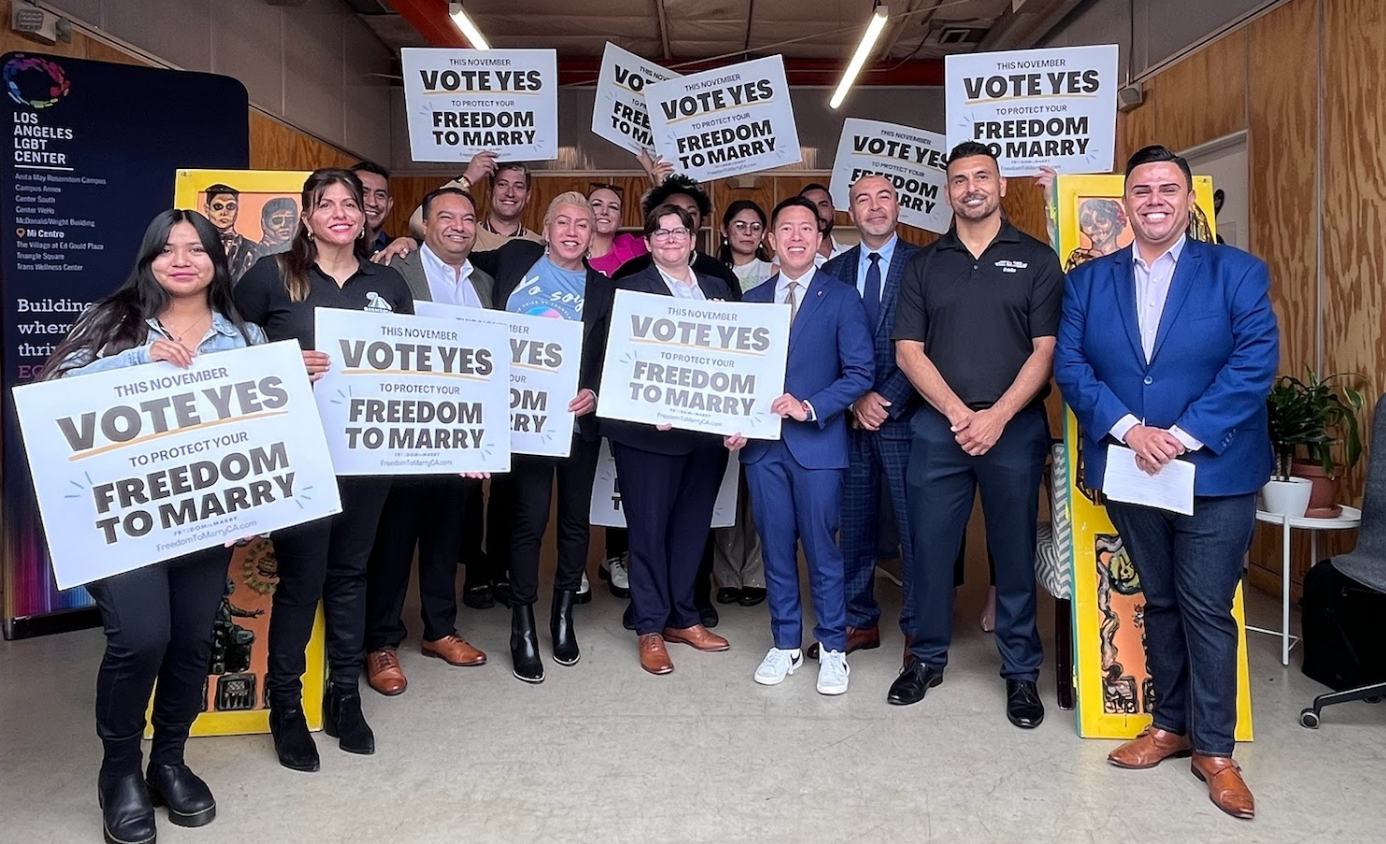
By Rob Salerno | LOS ANGELES – Leaders of a coalition of LGBTQ advocacy groups hosted a rally at the Mi Centro LGBT Community Centre in Los Angeles Thursday to launch the Southern California referendum campaign to repeal the discriminatory definition of marriage in the state constitution in November.
“California is a beacon of equality. Our state should always protect fundamental civil rights for all people and fight discrimination wherever it exists,” Tony Hoang, Executive Director of Equality California, told the launch rally. “The bottom line is that your freedom to marry is on the ballot in November. Let’s show the rest of the country that Californians stand up for freedom and equality.”
California voters narrowly affirmed Proposition 8, which added a ban on same-sex marriage to the state constitution, in 2008. The ban was eventually struck down under the due process clause of the US Constitution in decisions between 2010 and 2013, but the unenforceable ban remains in the state constitution.
But many observers are nervous that the extremely right-wing Supreme Court could reverse previous rulings that supported same-sex marriage, which could enable the ban to snap back into effect. These fears became acute when the Supreme Court’s 2022 Dobbs decision reversed decades of precedent by ending the right to abortion.
In a separate concurring opinion, Justice Clarence Thomas openly suggested that the ruling implied that the Supreme Court should overturn previous decisions legalizing same-sex marriage and intercourse.
“We know that there is a well-funded, well-organized group of extremist people who want to chip away the gains we have gotten over the last few years,” Bamby Salcedo, President & Chief Executive Officer of TransLatin@ Coalition told the rally. “This freedom to marry initiative isn’t just for gay or lesbian people. It’s for all of us.”
Terra Russell-Slavin, Chief Impact Officer of Los Angeles LGBT Center, recalled how her organization campaigned the last time marriage equality was put to voters.
“We’re having many of the same conversations today we had in 2008, but this time, with Californians who are on the right side of history. With the majority of Angelenos and Californias who understand that we share a special bond as caretakers of our community. That’s what makes us family, and that’s what will make us win in November,” Russell-Slavin said.
Speakers at the rally acknowledged that equality activists have had to do more outreach to minority communities in the years since Proposition 8 passed.
Eddie Martinez, a Huntington Park city councilor and executive director of the Latino Equity Alliance, reflected on how queer Latinos reached out to parents, neighbors, and community leaders to build common cause after exit polling revealed that Latinos mostly supported the marriage ban.
“Latine LGBT activists and organizations knew it was time to be united and to educate our community about marriage equality,” he said. “We went to communities that voted up to 60% [for Prop 8] to have one-on-one conversations on marriage equality and other issues of importance to the Latine community, such as immigration and workers’ rights. Our fight was intersectional.”
State legislators unanimously agreed to put a repeal question before voters last summer.
Last week, the state Democratic Party announced it is supporting passage of the Freedom to Marry ballot measure.
California isn’t the only state considering a freedom to marry ballot question in November. Voters in Hawaii and Colorado will also be deciding on propositions to repeal their constitution’s marriage bans.
“This is going to set the precedence for others to understand the importance of including these initiatives in their state constitutions,” Salcedo says. “We invite you to talk to your friends, talk to your neighbors, around your dinner table, to bring this issue to light because this is important to all of our communities.”
Related:
LGBTQ leaders launch SoCal Freedom to Marry campaign for Prop 8 Repeal
-
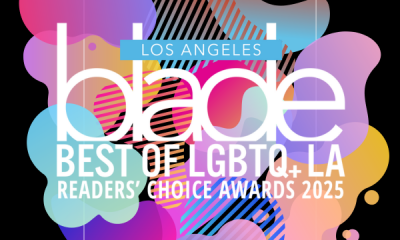
 Arts & Entertainment5 hours ago
Arts & Entertainment5 hours ago2025 Best of LGBTQ LA Readers’ Choice Award Nominations
-
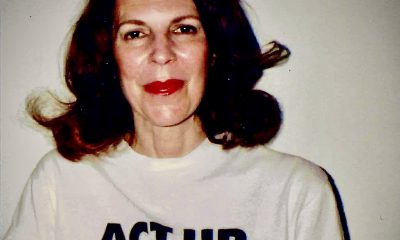
 Obituary3 days ago
Obituary3 days agoNanette Kazaoka, an unlikely AIDS activist, dies at 83
-

 Television4 days ago
Television4 days agoNo, ‘Mid-Century Modern’ is not a ‘Golden Girls’ remake
-

 Local7 hours ago
Local7 hours ago‘Think of those who have not been seen,’ Cynthia Erivo’s powerful message at GLAAD Awards
-

 Features6 hours ago
Features6 hours agoTristan Schukraft: Keeping Our Queer Spaces Thriving
-
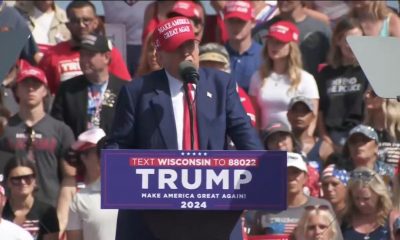
 Opinions5 hours ago
Opinions5 hours agoGay bar in California bans MAGA gear — but no other political expression — from its premises


